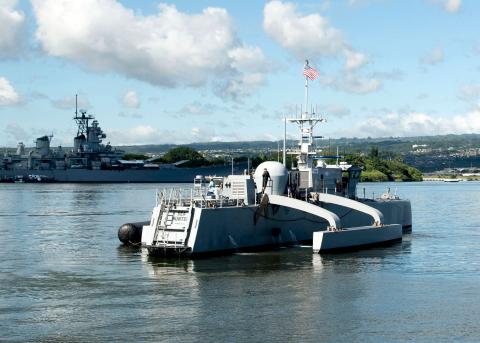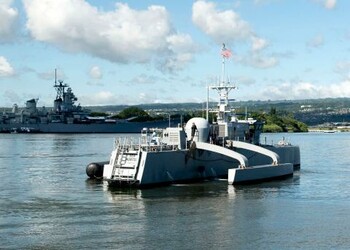Draper Tapped by U.S. Navy to Support Future Unmanned Surface Vehicles
CAMBRIDGE, MA—The U.S. Navy’s future unmanned surface vehicles (USVs) family of systems will set a new standard for navigating in hazardous environments, operating with minimal human control and executing missions further from port than previously imagined.
Among the organizations making the future of the Navy’s USVs possible is Draper, a company that has supported the U.S. Navy for more than 60 years. Draper was awarded a contract by the U.S. Navy to develop technology to support the unmanned surface vehicle family of systems.
Overall, the U.S. Navy has selected 40 companies to participate in a five-year, $982 million MAC (Multi Award Contract) to support the research, development and delivery of unmanned surface vehicles. In 2018, Draper won a similar award for the Navy’s unmanned underwater vehicles.
The indefinite delivery, indefinite quantity MAC identifies task orders in six functional areas. Draper will provide support in payloads, non-payload sensors and autonomy and vehicle control systems.
Key to Draper’s support of the Navy’s USV program is a simulation framework that enables engineers to design, develop, validate and execute real-time hardware-in-the-loop simulations and rapid assessment, integration and test of complex systems.
Built in support of the U.S. Navy, the Draper Simulation Framework is available to military and scientific organizations. More than 30 entities have requested access to the framework, and several prime contractors have used it.
“Under this award, Draper is prepared to meet the new standard for assured autonomy for autonomous surface vehicles and support the Navy’s requirement for greater flexibility—in mission design, operations and resource deployment,” said Joel Parry, Draper’s maritime warfare and intelligence, surveillance and reconnaissance (ISR) lead.
Draper will provide capabilities for Navy platforms that include Sea Hunter, the Medium and Large USVs and the Mine Countermeasures USV. The company will deliver sensor and actuator technologies, computing technologies, design methods and tools, modeling and simulation technologies, among others.
“Our capabilities in unmanned surface vehicles will continue Draper’s support of the U.S. Navy and its mission to remain unsurpassed in its global flexibility, agility and reach,” said Bill Borgia, director of mission systems at Draper. “Our innovative technologies and systems integration expertise enable long-term capabilities for the Navy to increase the range, reach and effectiveness of unmanned and surface forces.”
Released May 5, 2020

